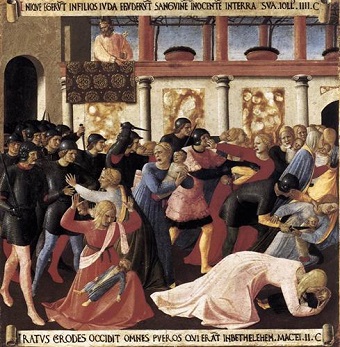THEOLOGY & APOLOGETICS
Secular History and the Slaughter of the Innocents
By Anthony Barbato

Hebrews 11:1-3 says:
Now faith is the assurance of things hoped for, the conviction of things not seen. For by it the men of old gained approval. By faith we understand that the worlds were prepared by the word of God, so that what is seen was not made out of things which are visible.Of course this doesn't mean we believe blindly. There's the Dead Sea scrolls proving accurate translation, there's archaeology that gives credit to Biblical stories, there's the life of Jesus, fulfilled prophecy and the miracle of the changed heart that all cry out as proofs the Bible can be trusted. The difference here is that Christ testifies of our sinfulness, and the world hates Him for it (John 7:7). We don't usually doubt the historicity of stories with only one source. But when that someone is God — the one who also condemns us in our actions calling them sinful — it's no surprise we try to discredit it to dull our guilt.
In any case, we're told "the righteous will live by his faith" (Habakkuk 2:4, cf. Romans 1:17; Galatians 3:11; Hebrews 10:38). As Paul says in 2 Corinthians 5:7, "For we walk by faith, not by sight." The Lord has given us more than enough reason to trust His word, and we shouldn't need the secular world to verify in order for our belief to stand. Regardless, even if there were multiple sources of the slaughter, doubters would still deny everything supernatural about Christ. Much like scholars confronted with the proof of His existence simply throw underfoot all His claims to deity. They say, "OK, he may have existed, but anything supernatural about the stories must be dismissed as false." It's their hard heart and spiritual blindness that keeps them from belief, not lack of proof (Matthew 13:15; 2 Corinthians 4:4). As Christ said, "If they do not listen to Moses and the Prophets, they will not be persuaded even if someone rises from the dead" (Luke 16:31).
In this case, it's really not as big a deal as nonbelievers make it. By this I mean the lack of other sources, not the killing of children. Was it a slaughter? Certainly. Of how many? Probably less than twenty. What skeptics fail to take into account is the reason behind Herod's killing of the infants. We read in Matthew 2:16, "Then when Herod saw that he had been tricked by the magi, he became very enraged, and sent and slew all the male children who were in Bethlehem and all its vicinity, from two years old and under, according to the time which he had determined from the magi."
The point was not to kill every child within Herod's entire kingdom, but rather to kill Jesus who was to be born in Bethlehem. This town you'd imagine was very small — with what research I did, estimating at the most maybe 1,000 people. So considering Herod commanded the killing of boys two and under, only in Bethlehem and its immediate vicinity, we can conclude it wasn't a slaughter of great proportions. With the high mortality rate, there probably wasn't a child in every household. And even if there was, the percentage of boys two and under in a small population as that would be very few. Without a doubt it was ruthless and unjustified, but small compared to what else was going on. Believe me when I tell you, Herod was a vicious and wicked man. He murdered members of his own family. Spend ten minutes researching what was recorded about him and you'll see why maybe twenty children in a small town in Israel wasn't considered newsworthy.
In any case, we can't expect the majority of people, sources aside, to believe the Word of God. As we read in 1 Corinthians 2:14, "But a natural man does not accept the things of the Spirit of God, for they are foolishness to him; and he cannot understand them, because they are spiritually appraised" (cf Matthew 11:25; 13:11; 16:17; Luke 10:21; 1 Corinthians 1:18).
For we did not follow cleverly devised tales when we made known to you the power and coming of our Lord Jesus Christ, but we were eyewitnesses of His majesty. For when He received honor and glory from God the Father, such an utterance as this was made to Him by the Majestic Glory, 'This is My beloved Son with whom I am well-pleased'-- and we ourselves heard this utterance made from heaven when we were with Him on the holy mountain. So we have the prophetic word made more sure, to which you do well to pay attention as to a lamp shining in a dark place, until the day dawns and the morning star arises in your hearts. But know this first of all, that no prophecy of Scripture is a matter of one's own interpretation, for no prophecy was ever made by an act of human will, but men moved by the Holy Spirit spoke from God. 2 Peter 1:16-21
Image Credit: Fra Angelico; "Massacre of the Innocents"; 1452; Public Domain
Tags: Biblical-Truth | History-Apologetics
comments powered by Disqus
Published 9-24-2015

